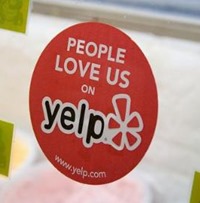 |
| Actual firing Facebook photo |
So, what do you do?
 |
| Actual firing Facebook photo |
Do you like what you read? Receive updates two different ways:
Subscribe to the feed or register for free email updates.
Do you like what you read? Receive updates two different ways:
Subscribe to the feed or register for free email updates.
United CEO email to employees obtained by ABC's @Shahriar44R: "there are lessons we can learn from this experience" pic.twitter.com/N1TbohuRc3— Michael Del Moro (@MikeDelMoro) April 10, 2017
Do you like what you read? Receive updates two different ways:
Subscribe to the feed or register for free email updates.
 |
| I posted this from work yesterday |
Do you like what you read? Receive updates two different ways:
Subscribe to the feed or register for free email updates.
 |
| Business in the front, party in the rear |
Do you like what you read? Receive updates two different ways:
Subscribe to the feed or register for free email updates.
Do you like what you read? Receive updates two different ways:
Subscribe to the feed or register for free email updates.
Do you like what you read? Receive updates two different ways:
Subscribe to the feed or register for free email updates.
Do you like what you read? Receive updates two different ways:
Subscribe to the feed or register for free email updates.
Do you like what you read? Receive updates two different ways:
Subscribe to the feed or register for free email updates.
Do you like what you read? Receive updates two different ways:
Subscribe to the feed or register for free email updates.
Do you like what you read? Receive updates two different ways:
Subscribe to the feed or register for free email updates.
Do you like what you read? Receive updates two different ways:
Subscribe to the feed or register for free email updates.
 |
| http://www.pewinternet.org/2016/06/22/social-media-and-the-workplace/pi_2016-06-22_social-media-and-work_0-01/ |
Do you like what you read? Receive updates two different ways:
Subscribe to the feed or register for free email updates.
Do you like what you read? Receive updates two different ways:
Subscribe to the feed or register for free email updates.

Kennedy’s tweet concerning snow days was directed to Chipotle’s communications director but visible to others; Kennedy’s other two tweets were in response to customer postings, and likewise visible to others. All these postings had the purpose of educating the public and creating sympathy and support for hourly workers in general and Chipotle’s workers in specific. They did not pertain to wholly personal issues relevant only to Kennedy but were truly group complaints. I conclude that Kennedy’s postings constitute protected concerted activity.
If, as the Board suggest, employee intent is the measuring stick for whether a lone employee’s activity is concerted, then any employee’s solitary social-media post can be considered concerted merely by the employee stating an intent to initiate or induce group action. And, since social media is inherently social (i.e., group in nature), doesn’t this test suggest that all such activity is concerted.
Do you like what you read? Receive updates two different ways:
Subscribe to the feed or register for free email updates.
 Consider the following scenario. An employee makes offensive posts on his personal Facebook page about one of your customers, which include the following:
Consider the following scenario. An employee makes offensive posts on his personal Facebook page about one of your customers, which include the following:
“I seen Maurice’s bougie ass walking kahului beach road … nigga please!”
A number of other employees comment on or like the post, including a comment to “run that faka over!!! lol.”
When the customer learns of the posts and comments, he complains. You investigate and fire the offending employees.
Case over, right? Not so fast. The customer sued the employer for negligence relating to its supervision, retention, and training of the offending employees.
Do you like what you read? Receive updates two different ways:
Subscribe to the feed or register for free email updates.
 By now, you’ve likely heard about the employee fired by Yelp for her very public blog post directed at her former employer’s CEO, criticizing her $24,000 annual salary. Here’s a particular biting excerpt:
By now, you’ve likely heard about the employee fired by Yelp for her very public blog post directed at her former employer’s CEO, criticizing her $24,000 annual salary. Here’s a particular biting excerpt:I wonder what it would be like if I made $24,000 more annually. I could probably get the headlight fixed on my car. And the flat tire. And maybe even get the oil change and renewed registration — but I don’t want to dream too extravagantly. Maybe you could cut out all the coconut waters altogether? You could probably cut back on a lot of the drinks and snacks that are stocked on every single floor. I mean, I could handle losing out on pistachio nuts if I was getting paid enough to afford groceries. No one really eats the pistachios anyway — have you ever tried answering the phone fifty times an hour while eating pistachios? Those hard shells really get in the way of talking to hundreds of customers and restaurants a day.
Do you like what you read? Receive updates two different ways:
Subscribe to the feed or register for free email updates.
Do you like what you read? Receive updates two different ways:
Subscribe to the feed or register for free email updates.
Do you like what you read? Receive updates two different ways:
Subscribe to the feed or register for free email updates.
Yesterday, #ElderlyChristmasSongs trended on Twitter. Yes, it’s meant to be a joke, and, yes, some were even funny. Now here’s the part where I get to play Employment Law Scrooge.
Do you like what you read? Receive updates two different ways:
Subscribe to the feed or register for free email updates.